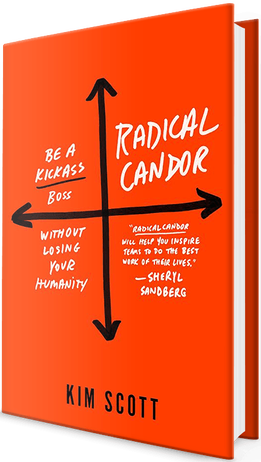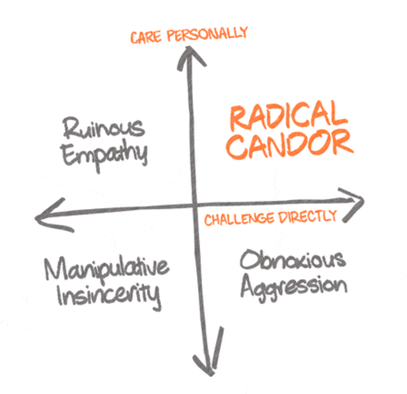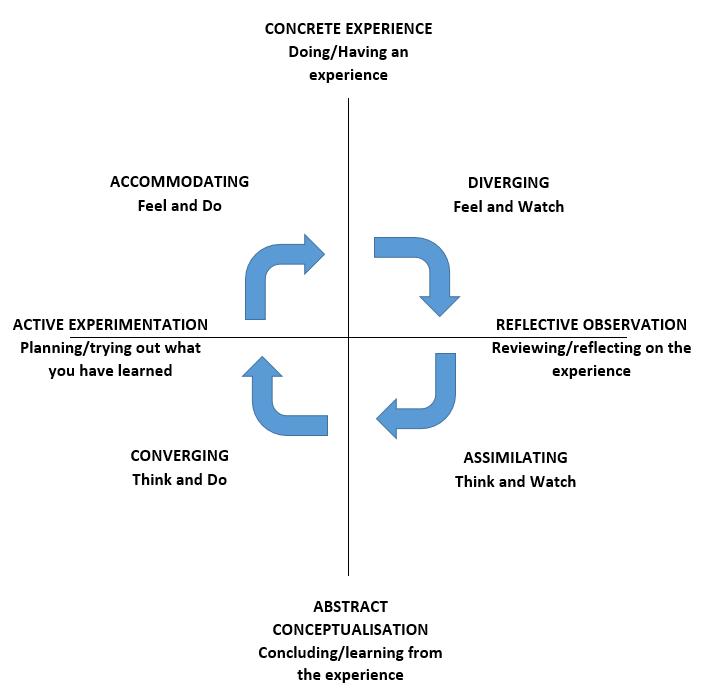|
If you are a manager committed to leading in a coaching way; a manager who has done some “Manager as Coach” training or who has read and experimented prolifically with coaching as a style; a manager who sincerely works at using a coaching approach to leading your teams; a manager who is human, has bad days, experiences stress and pressure, and who inevitably messes up despite your best intentions; this series of articles is for you. In this third article in a series of monthly series of 12 articles first published in SA Coaching News, I will share tools, techniques and practices that you can use over time to create new default behaviours that will enable you to live into your intentions of being a coach and creating a coaching culture in your team.
Article 3: You Can't Dish What You Can't Take One of my books of the year (early though the year might be) is “Radical Candor” by Kim Scott. The model on which the book is based, and which I think is such a powerful tool for the Coaching Manager. For the purposes of this article I have shamelessly lifted a simple explanation from Scott’s website: www.radicalcandor.com. |
Obnoxious Aggression™ is what happens when you challenge but don’t care. It’s praise that doesn’t feel sincere or criticism that isn’t delivered kindly.
Ruinous Empathy™ is what happens when you care but don’t challenge. It’s praise that isn’t specific enough to help the person understand what was good or criticism that is sugarcoated and unclear.
Manipulative Insincerity™ is what happens when you neither care nor challenge. It’s praise that is non-specific and insincere or criticism that is neither clear nor kind.
Radical Candour is the quality of feedback that happens when you skilfully challenge directly within the context of a relationship in which your personal care is clearly apparent. It is not enough for you to know that you care. It is important for your team member or colleague to also know that you care.
Radical candour is the quadrant within with the Coaching Manager belongs. Coaching Managers I have worked with have had some or all of the following good intentions in adopting coaching as their style:
- To be a good manager
- To take a good team and make it really great
- To enable team members to achieve their potential
- To help average and weak performers to improve
- To get people to think for themselves
- To foster innovation in the team
- To build relationships
- To develop people in support of their career aspirations
We really can’t engage well on any of these topics if there isn’t a relationship characterised by care and complete honesty between you and your team members.
One of the most important leadership lessons that I have learned in my years of working with managers is that if you want your team members to be able to take honest feedback and guidance, you yourself need to be able to take it. A second aspect of this is that you also need to be able to take it publicly. Good managers hold themselves to the injunction to praise publicly and criticise privately – well you don’t have that luxury.
This is actually something of a blessing in that it presents you with the opportunity to model or demonstrate healthy responses to criticism. When your team sees you take criticism in an open and non-defensive manner, you become better able to expect that they will take criticism or constructive feedback in a non-defensive way. If you genuinely want to elevate the levels of honesty between yourself and your team, you need to put yourself directly in line for feedback.
Also from the wonderful Kim Scott book, Radical Candor, comes this fabulous question that invites feedback on your own impact on your team: What can I do or stop doing that will make it easier to work with me?
What a wonderful question! But how you respond is everything. On no account should you defend, justify, explain or retaliate. If you do that, you will never get useful feedback again. Appropriate responses include:
- Thank you for that. It must have taken courage to go first.
- Tell me more so that I understand you better.
- That’s really useful! I didn’t realise I was doing that!
- I will definitely give that a try. Thank you.
- You’ve given me something to think about. Can I go away and think about this and then we can pick it up again next time? (And make sure that you do!)
Some of the feedback will be easy to take. Some of it will be more difficult. When the feedback is difficult, make sure to press your internal Pause Button. Breathe. Smile. Say thank you.
When the feedback is difficult and you feel defensive, take time to think about it. Chat with a colleague who you trust to be honest with you. Ask for their input on what they have observed in your behaviour. Ask their advice on how you might respond. Prepare your response. Test your response with your trusted colleague. When you are happy that your response will come across as thoughtful and mature, go back to the team. Tell the team what you intend doing with the feedback and how they can support you in your efforts.
Demonstrating your ability to take feedback or criticism well publicly sets the foundation for you to be able to give feedback privately to your team members, and use that feedback to support their growth. You have shown how it is done; you have demonstrated that you and your team are taking a journey together; you have demonstrated humility as well as courage; you have earned a special kind of respect; and you have demonstrated a respectful response.
In the next article, I will talk about having an evaluative discussion with team members that will be the basis for a coaching journey you could take with them.
In the meantime, I highly recommend that you read Radical Candor by Kim Scott (ISBN 978150984538590100) available in print, e-book and audiobook. Share it with your team! Use it as the basis for some really authentic conversations.
About the Author:
Belinda Davies is a business coach with special interests in strategy and leadership. She has been a coach since 2002, having been in the business of people development since 1986. She is a credentialed COMENSA Master Practitioner.
Contact details:
Email [email protected]
Mobile 0825519504
Website: www.leadershipsolutions.co.za




 RSS Feed
RSS Feed


